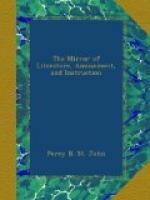end of it, that it goes off without hanging fire.
The diseases of the body, too, that are produced by
a damp atmosphere, are uncommon here. It may
be a matter of surprise to some to hear, that pectoral
and catarrhal complaints, which, from an association
of ideas they may connect with cold, are here hardly
known. In the cathedral at Montreal, where from
three to five thousand people assemble every Sunday,
you will seldom find the service interrupted by a cough,
even in the dead of winter and in hard frost; whereas,
in Britain, from the days of Shakspeare, even in a
small country church, “coughing drowns the parson’s
saw.” Pulmonary consumption, too, the scourge
alike of England and the sea-coast of America, is
so rare in the northern parts of New York and Pennsylvania,
and the whole of Upper Canada, that in eight years’
residence I have not seen as many cases of the disease
as I have in a day’s visit to a provincial infirmary
at home. The only disease we are annoyed with
here, that we are not accustomed to at home, is the
intermittent fever,—and that, though most
abominably annoying, is not by any means dangerous:
indeed, one of the most annoying circumstances connected
with it is, that, instead of being sympathized with,
you are only laughed at. Otherwise the climate
is infinitely more healthy than that of England.
Indeed, it may be pronounced the most healthy country
under the sun, considering that whisky can be procured
for about one shilling sterling per gallon. Though
the cold of a Canadian winter is great, it is neither
distressing nor disagreeable. There is no day
during winter, except a rainy one, in which a man need
be kept from his work. It is a fact, though as
startling as some of the dogmas of the Edinburgh school
of political economy, that the thermometer is no judge
of warm or cold weather. Thus, with us in Canada,
when it is low, (say at zero,) there is not a breath
of hair, and you can judge of the cold of the morning
by the smoke rising from the chimney of a cottage,
and shooting up straight like the steeple of a church,
then gradually melting away in the beautiful clear
blue of the morning sky: yet in such weather
it is impossible to go through a day’s march
in your great coat; whereas, at home, when the wind
blows from the north-east, though the thermometer
stands at from 55 deg. to 60 deg. you find a fire far
from oppressive. The fact is, that a Canadian
winter is by far the pleasantest season of the year,
for everybody is idle, and everybody is determined
to enjoy himself. Between the summer and winter
of Canada, a season exists, called the Indian summer.
During this period, the atmosphere has a smoky, hazy
effect, which is ascribed by the people generally
to the simultaneous burning of the prairies of the
western part of the continent. This explanation
I take to be absurd; since, if it were so to be accounted
for, the wind must necessarily blow from that quarter,
which is not in all instances the case. During




